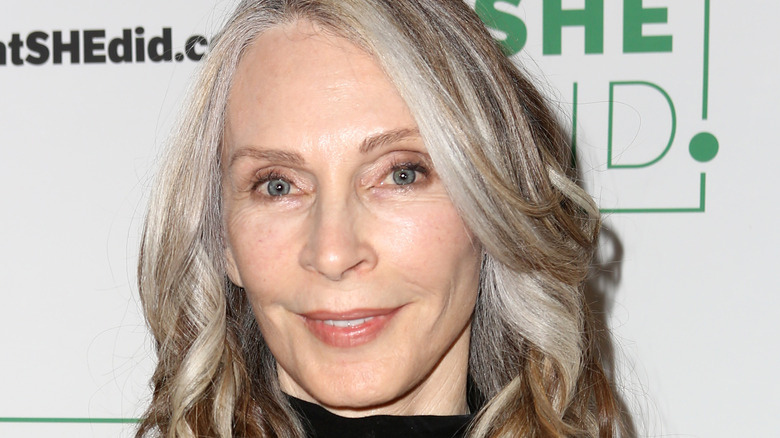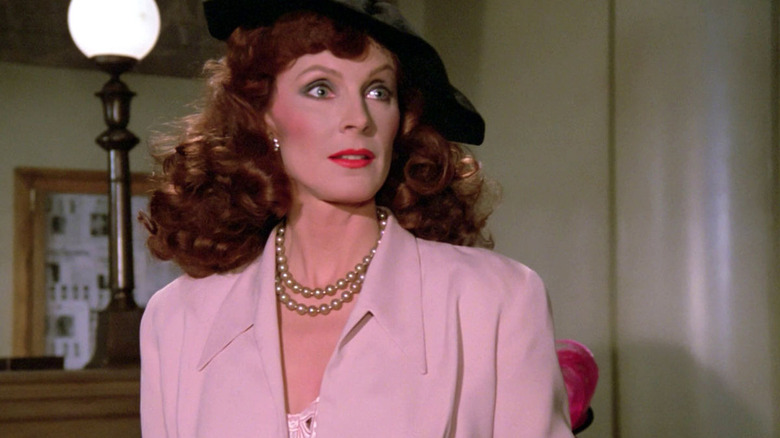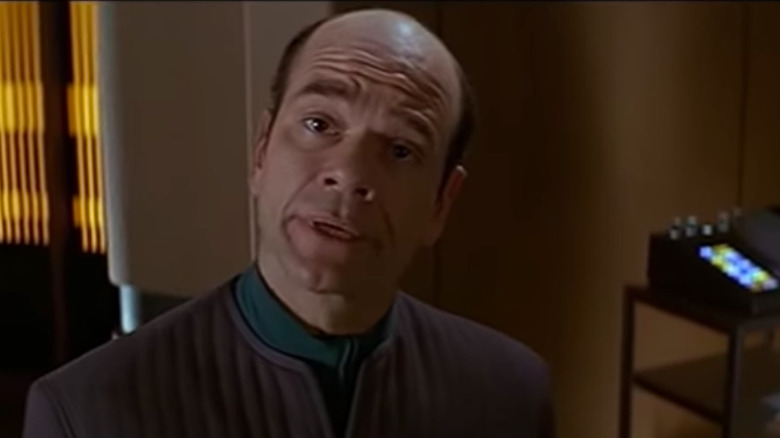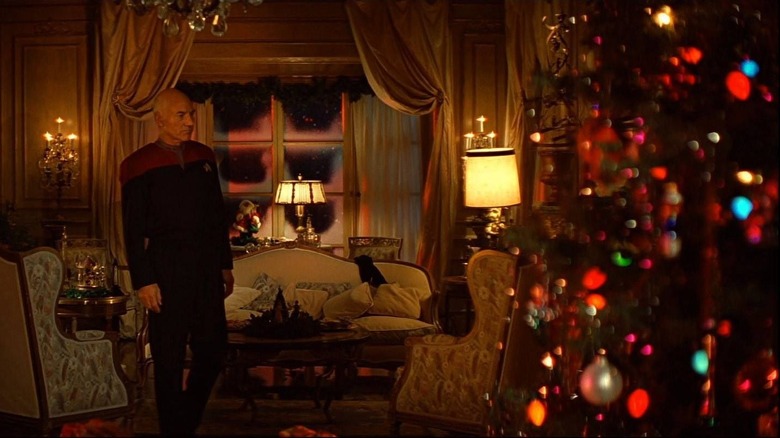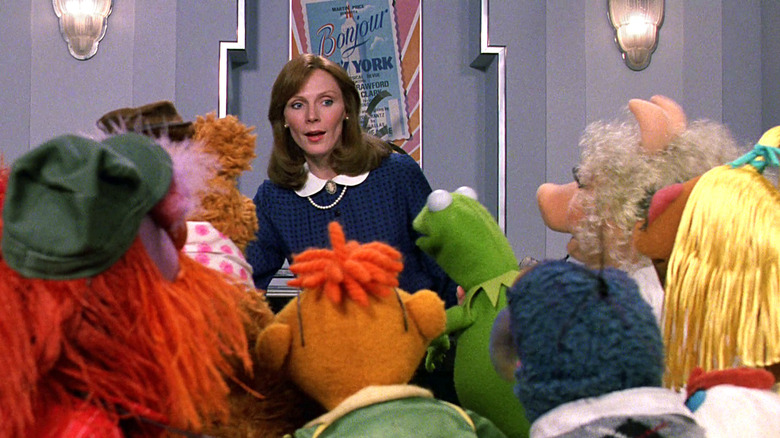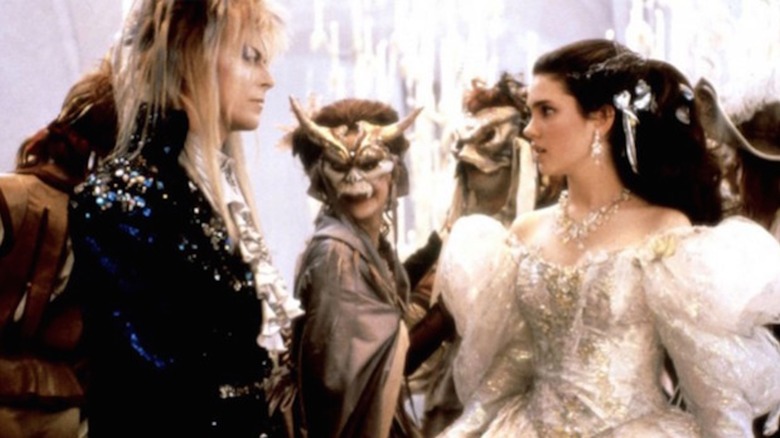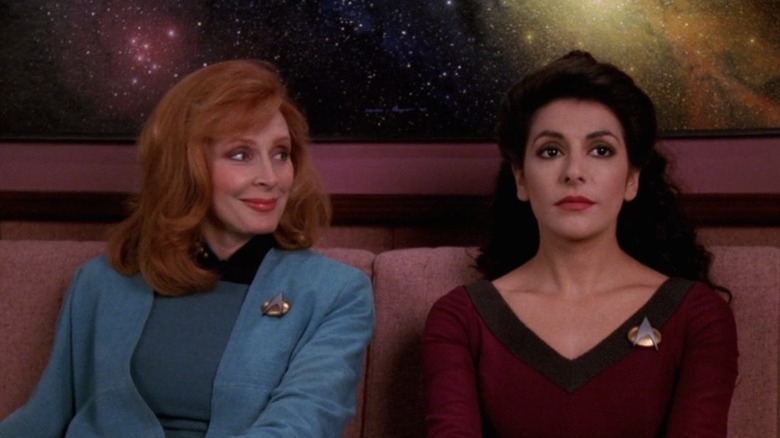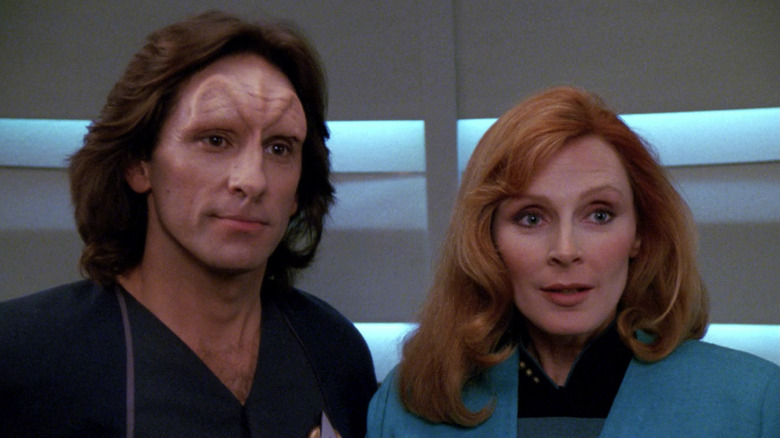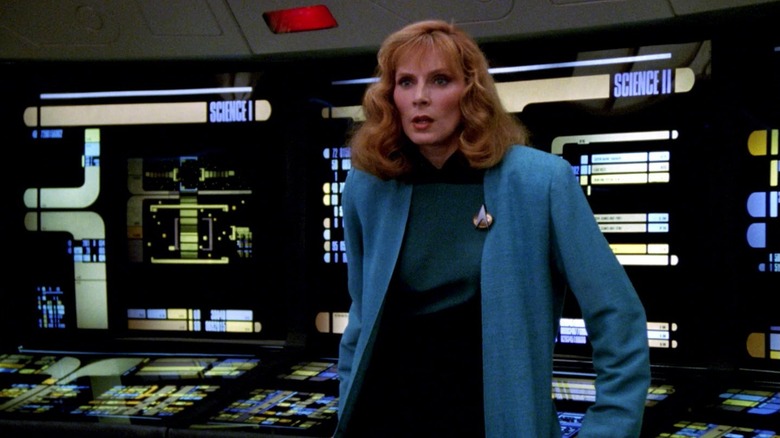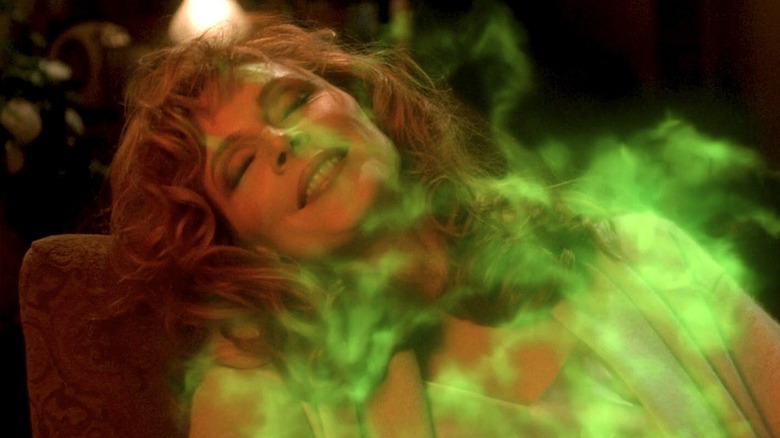What Gates McFadden Wants You To Know About Podcasting, Star Trek's Beverly Crusher, And More - Exclusive Interview
We've all had a strange last year. And in addition to everything else that happened in 2020, there was one, common activity which everyone from your mom to the Pope seemed to take on: podcasting. It would seem not even spacefaring doctors from the 24th century are immune to the audio-based pastime — and we know this because Gates McFadden has a podcast coming out beginning May 12 called "Gates McFadden InvestiGates: Who Do You Think You Are." Since McFadden spent six out of seven seasons of "Star Trek: The Next Generation" playing Doctor Beverly Crusher, she's using this podcast as an excuse to talk with her nearest and dearest "Trek" family — not about Gene Roddenberry's seminal TV franchise, but about their personal lives.
McFadden's podcast includes interviews with a list of guests that includes her "TNG" co-stars Jonathan Frakes, Marina Sirtis, Wil Wheaton, John DeLancie, Michael Dorn, LeVar Burton, Brent Spiner, and Denise Crosby. She's also extending her interviews to people outside the "TNG" realm, including Robert Picardo, who played the Doctor on "Star Trek: Voyager" and Nana Visitor from "Star Trek: Deep Space Nine."
Looper sat down with Gates McFadden to talk about her new podcast. While we were chatting, we also discussed her work on "Labyrinth" — and yes, we talked about her time on "Star Trek: The Next Generation," including some of the more unpredictable romances her character Dr. Beverly Crusher was involved in over the years.
How Gates McFadden finally agreed to do a podcast
Tell us the story of how you came to decide you were going to do a podcast — and this podcast specifically.
So I was sitting in my house, and the phone rang, and it was the CEO of Nacelle, Brian Volk-Weiss, who is fantastic. And I had never met him, and he's like, "Hi, this is Brian Volk-Weiss. I really, really want you to do a podcast that we will produce. I just know this is good." And I'm like, "What? Who are you? What?" I was like, "You want me?" I said, "You really want Patrick [Stewart], but you'll settle for me." He said, "No, no, no. I want you to do this." And I'm like, "A podcast." And he said, "Yeah, a podcast about 'Star Trek' with the cast."
I said, "Okay, first of all, Brian, there's no way I'm going to get one friend of mine from 'Star Trek' to go on a podcast with me, and we're going to talk about 'Star Trek,' because we talk about it all the time with everyone else, interviewing. I just don't think so." I mean, I do odd things. I have an eclectic career. That's an understatement. But I said, "I just don't think so." And then he came back a couple of weeks later, or a week later, and said, "I really think you should rethink this, because I think it would be great. You can talk about whatever you want." And I'm like, "But I don't have any vision of what it would be." He said, "Well, talk to your friends. We never get to see that." And I said, "I don't know, I'll think about it, but I don't think so." He came back a third time and asked me. The last time I took two times to say no and then finally said yes was for "Star Trek," playing Dr. Crusher. There's something about me that's really stupid, that says no to these great things that I get offered. And I went, "Okay, I'm going to say yes."
So I said yes. And I was nervous. I didn't know quite what I was going to do, but obviously I love my friends. We are always in contact with each other, and I was going to start with the "Next Gen" people. But then I'm friends with a lot of other people from different "Star Trek" casts. And I thought, "Well, that will be great too, because we'll see what we're going to talk about." And I would research people that I already knew all the stuff they did, but I wanted to look at it again. That sort of thing. And then I would just come up with stuff, and we'd talk about it. And everyone was different. Some people, it was more serious. Other people, it was more wacky. I think one of my favorites is with Wil Wheaton, because I love my space son. We're close. He's one of the best. And he is so good at podcasting, hosting and all of that, that I thought, "Okay, he's going to be interviewing me. I've got to make this like a conversation. How do I do that?"
So the idea that I came up with was that we were going to play games. It couldn't be video games, because of the pandemic and stuff. So I came up with just starting with Never Have I Ever, and we got down to it. We talked about things that might be a bit shocking, but I learned a lot about him. And I am sure he learned more than he ever wanted to know about me. And then I had philosophical, ethical questions, and we just started talking about all sorts of subjects, very random. I mean, it really is the gamut. And that's when I started to realize I could open up the list of things we're talking about, and I've had so much fun doing it. I've learned how to sound edit, even though Naselle has someone who double checks all of my sound edits and makes it really come up to snuff. But I've loved learning a new skill. I've loved the challenge of how do I ... It's not really an intimate conversation with my friends, but parts of it are intimate. And how do you do that? So I'm excited.
The personal stories behind InvestiGates
Did you find yourself not only hearing these people's candid stories, but also digging in and remembering stuff about your family and your past and looking at it from a present day lens?
Absolutely. And that was the tricky part, because there was part of it that I did want it to be a conversation. I didn't set off ... I never asked my friends, "Well, this is how I'm going to interview you." That's a different format. It's not that I couldn't interview my friends, but I wanted it to be more of showing somehow ... I think sort of showing how also close we all are, that we can flip from subjects, and we can laugh, and something unexpected happens. LeVar is just a remarkable human being. And he is very sincere and honest and also very funny. And I love the clip that really happens at the beginning, where I'm asking him to ... There's a thing we have about perfumes and smells. And he smells through the Zoom. He picked up on it, and it was like an improv. And that's what's awesome. They didn't say, "What are you talking about?" It was like, he went with it, and I loved it. And also, Brent gave me one of the biggest belly laughs I've had in years. And that just happened near the end, when it was a truthful moment. I was saying something, and he said, "Well, that's not the way I remember it." And then we started to get into it, and it was hilarious.
In addition to interviewing a lot of the "Star Trek: The Next Generation" cast, you're also talking with people from other "Trek" shows like Bob Picardo, who played the Doctor on "Star Trek: Voyager," and Nana Visitor, who plays Major Kira Nerys on "Star Trek: Deep Space Nine." Is it different at this point, or are you close with everybody from the "Trek" convention circuit?
Well, we're really close. I mean, obviously I'm closest to people in my own cast. Obviously, we've gone through, how many years? I mean, it's like over 35 years or something. But I've also run into these people for years. And there's something that has happened in the last several years, where we all have spent much more time together, because more of us have done cruises, which I had never done. So you're really hanging out, you're having dinner, you're having lunch, breakfast and having drinks afterwards, maybe. You get to know people. And that is really the plus of this whole deal. The people who are on all these casts of "Star Trek" are pretty great. They're really great human beings, and I love getting to know things about them. And I play around with several of them.
Nana, we talked about several things, and it turned into a double episode because of a reaction I had to something she had said. And it was interesting, and I wanted to talk more about it. And I also was fascinated by her upbringing in New York City, because I was trying to learn dance in Ohio. She was studying dance with the best of the best. And it's really interesting. So yeah, well, we have done different things together. And also John Delancey, I mean, he's just wonderful. You could really have conversations that go on for six hours with most of the people. It was a lot of fun. And I think I was nervous in the beginning. I have no idea how I come out. I mean, that is the one I go, "Well, I don't know." And I took out different stories that were about me, because I wanted to showcase the other person as much as possible. But yeah, it was unexpected. And I think it was a perfect year, the pandemic year, it helped me from jumping off the cliff to have something new I could do.
Gates McFadden's Christmas story
You said that you deleted a bunch of your own stories because you wanted the focus to be on the people you were interviewing. What is something that didn't make the cut, a story that you think is maybe something that people don't know about you that sort of happened in the mix?
There were just some things of when I was little, although I do talk about stuff, especially one with Wil, that I think is a really interesting story. But just different things. When you talk about ... I think I deleted the one about Christmas, when I came home in tears, just sobbing, after first grade, when we first learned "'Twas the Night Before Christmas," because of the line "The stockings were hung on the mantle with care." And we just lived in this one-bedroom apartment, and there was no chimney, or mantle, or anything. And my parents, they were so great. They were like, "Well, honey, I think he came last year." And I was like, "No, he's not going to." And I mean, I just cried and cried. And so the next day, Dad comes home with some plywood and stuff, and he goes, "Well, we're just going to have to do something about this." And so he builds a fake fireplace mantle — really, I mean, cheesy. Not like something gorgeous. But it was something we could put up against the wall every Christmas, which we did. And my mother found brick crepe paper and put it all on there, and they screwed in little hooks. I mean, it really looked like a second grade project that you did at school, but I felt so good. And I'd put cookies there, and I'd do all that thing. I mean, my belief was 100%, that now this was going to happen and Santa came.
The difference between Jim Henson and Frank Oz
When you did work on "Labyrinth," the director was Jim Henson. When you did work on "The Muppets Take Manhattan," the director was Frank Oz. Bert and Ernie, Miss Piggy and Kermit — they're very different guys. I'm curious what the difference is between working with Jim as a director and working with Frank as a director?
Well, I think Frank is very clear about what he wants for a moment. I think he is more of ... He really is a director, in the way that I've encountered most directors. I think Jim is somebody who has great ... He was somebody who had great imagination and would find people who he thought he believed in and he sort of thought were going to come up with something. And then he would be able to say, "No, I don't like that." Or, "Yes, I like that." I did the same thing with the director, Gavin Miller, who was the one who directed "Dreamchild." I wasn't allowed to have official credit on it. They had to say, "Special thanks to Cheryl McFadden," because British Equity would not give me working papers. And also, British Equity would not let me act in "Labyrinth." I was supposed to play Jennifer Connelly's mother. That's why I took the job. But then Frank Oz, afterwards, asked me if I would do the choreography for "Little Shop of Horrors," the plant, but I didn't. I wanted to get back to acting. It was just a fluke in a way that I ended up doing "Labyrinth," because I'd had an accident, a skiing accident, and I lost two fabulous acting jobs. And so I was like, "Oh, my gosh, what am I going to do?" And then I got the offer for "Labyrinth," and I decided to do it.
Labyrinth and dancing with David Bowie
I have a long-held "Labyrinth" theory and I'd love for you to weigh in on it. So, the dream sequence with Jennifer Connelly and David Bowie — my belief is that it cuts through, no matter what your age, your gender, anything else: you watch that scene, and you want to be Jennifer Connelly in that dress, dancing with David Bowie, no matter who you are.
Yep.
What was it like doing that scene with Jim and Jennifer and David Bowie?
I was given the soundstage. I got to cast my dancers, and there was a whole soundstage that was going to be for the ballroom, so I rehearsed in that. I mean, the masks and costumes for the whole thing were just extraordinary. And David Bowie was just amazingly normal. I mean, he was such a genius. I idolized so many things that he had done. But for some reason, I was almost too stressed at that point to fangirl. It was funny because I had all this responsibility, but he was great. When I think about the fact that I actually was standing in for Jennifer and showing him how to do the waltz and do different things, I mean, really, what a treat.
He and I actually had worked on it, so that ... And this shows where I was a novice with film. I was doing it more for a theater. When he would disappear, he actually, we worked it out choreographically, so he literally would disappear. He would hide. There'd be other dancers, and you didn't know where he had gone. And then when they edited it, they chose different spots. And it was like, "Oh, no." I could have done it so differently and not had to fool around with all those cool transitions, because they just would edit. But he was game for it, is my point. He was willing to make it be magical, because he was into theater as well as film.
How Beverly Crusher would be different if she was written now
I saw you tweet something about an article that had come out, and it made me wonder, how would "Star Trek" be different — and specifically, how do you see Beverly as being different — if the show had come out now? How do you think that would change things?
Well, I think she would have been involved in many more command things, and I would have been doing more stunts, although I was able to do most of my stunts. I didn't do the falling off the ship in the movie, because the insurance wouldn't let us. And that one, I was actually quite happy not to do, because I don't trust the water in Santa Monica. But I think it was a start. There were many things that I, at the time, was like, "Well, why can't this happen? Why is it always this?" And one of the things I've bemoaned, and I think it hurt me that I was vocal about it, was that ...
I have a son who's just about 30, and we talk about everything. We talk about the projects. I talk about my projects with him. I listen to his opinion. He listens to my opinion, and we have two ways of relating. One is mother-son. And another is just a peer-to-peer, because I he's a terrific artist, and I really respect him. And all the time growing up, I mean, we had very important and profound conversations about world events, all sorts of things. And Wesley Crusher and Beverly Crusher never had anything like that. He only went to talk to the men, and I understood that was because he was missing the father figure in his life. But there was a certain point where I thought, "Well, wait a minute, who helped raise this genius who's saving our ass every single week?" And also used to bother the fans, but I think it was really smart, because that's exactly what happened in the tech world. They were all people who were 24 years old, who were figuring out how to run the world. So I don't know. I mean, there were a lot of things like that. I also think the biggest hole is any kind of female relationships with each other. I mean, I didn't have one scene with Tasha Yar. And then when you have a scene, all you do is talk about men.
Yeah. It feels like there would have been less of the space yoga.
Well, I even wished they had used my pregnancy. I got pregnant with my son during it. I asked, I said, "Can we use it?" Because it would've been great if she would have just not said whose baby it was. But that was something that ... They were very straight in that way. During our show, I felt they were very old-fashioned about the women's role, and mothers are a certain way, and dads are going to really tell you the truth and talk to you, and moms are just going to worry about your lunch box a little bit more.
Beverly Crusher's romance with Odan: revisited
I saw you tweet about an episode called "The Host" with Beverly's love interest Odan because there was that article that had come out about the subject. And it's a tweet, and it's been valuable tweet, but I want to talk about it with you, because I really thought you landed on something, and I wanted to elaborate. How do you look at that episode now, especially the part about Beverly not staying with Odan after they became a woman?
Well, I felt that it was looked at as a very surface responsive, that's what it is. It's just because she's a woman. You can say the dialogue, and you can say, "Okay, she's doing that because it's a woman." And yet she was fine with it being her friend who was a man. And I think that's too easy in a way. I think that might be what many of the writers were thinking. But actually if you just observe what's going on, that's not what I was playing. I think if you are really in love with someone, and then all of a sudden there's this, within a matter of 24 hours, this host gets put into someone else, and you're still so worried about whether the host is going to live in the operation and how it's going to handle, it doesn't seem a leap.
Whether it had been put into Deanna Troy or put into Riker, I think that would have made sense. I think it's the fact that then there's another person, and it's just too quick to ... I mean, if you think about it, if you fell in love with ... How much is the physical, how much is the experience? How much is the emotional, the intellectual? That was the power to me of that episode, that you asked the question, what is love? How much is physical? And that was very powerful, because the best of "Star Trek" is when it gets people to think, to weigh conflicting information and go, "Well, that's feels ambivalent."
Yeah. How can you hold that ambivalence? And how can you think about all these aspects of it? Because really, what if the only body to put it into had been a child? There's all sorts of things that you can think about. But to me, when I turned her down, all this had happened within a matter of two days, all of these operations. I think it's too much to handle, because it's not that only the host was the only part. There is a physical part as well. And it has to do with it being ... I imagined it was like, I don't care whether it was a relationship where it had been put into a male and then another male and then another male. How many times can you just jump? I think it has to do with not being able to process. For me, that's what I was playing. I can't process this. I'm just not ready for this. Maybe someday people will.
"Star Trek: The Next Generation" was episodic, which in many ways worked to its benefit. But this is one of those stories where it's such a complex question that I find myself thinking, what would have happened if it was serialized storytelling? And I find myself thinking, "Well, maybe that's a story that could have evolved over time."
Exactly. That's a very interesting story. I agree.
The Inner Light vs. Remember Me
A lot of people point to "The Inner Light" as this great, life-affirming Captain Picard episode. I think Beverly Crusher has an equivalent with the episode "Remember Me." You're interacting with an old friend, and they're talking about how you lose all these people as you get older. And then all of a sudden, it's science fiction so this fantastical narrative gets weaved around that idea. The older I get, the more that story resonates. And I wonder if you have any thoughts about that one, looking back as you get older?
Well, looking back, there was somebody who had ... I don't know if it was an interview or somewhere. I can't remember how it reached me, but I was taken with ... This happened quite a few years ago, actually. But some woman wrote — it's interesting and wonderful that even though she was saying, "Wait a minute, this whole other group were here and these people are gone," Picard never doubted that she was just like, "Oh, you're just being a hysterical woman here. It's okay." He always believed her, whatever she said. He would go, "No, I think we are the only two people on the ship, but let's run another diagnosis."
I think that showed how women were respected, which was a great thing. I also think it's a good lesson, always take the time to be curious and go, "Well, actually I know it sounds crazy, but let's take a look." I thought of it as a very strong, heroic episode for Crusher, because she was alone. And rather than going into any panic, she was staying very scientific about it. And there was a connection that was ... And it never really got talked about, but I thought there was a connection almost happening between she and Wesley, who was back on Earth, that there's two minds. These minds that had been forged, growing together when they were young, that wasn't really dealt with. But I thought it was a really, really beautiful episode.
I agree. And it's interesting that you brought up the relationship with Picard. A lot of people focus on the potential romance between the two, but I think their friendship is just as important, if not more so.
Well, it's interesting, because I think you can have a friendship and a sexual relationship possibly, and it certainly doesn't have to always be sexual at all. I feel that it's powerful when there's someone you've known for a long time and they've gone through a lot of different major things, like the death of a husband or whatever. It's great to have that. The year that I was not there, they added Whoopi's character. And Whoopi's character was the person who also took over some of what Crusher had been talking ... like being the one that he would talk to about some of those affairs. Now, I adore Whoopi's character, and I absolutely think she's an amazing artist. So I'm very glad that she was involved in the show, or I might not have ever met her. But I think it's finding what that is.
And when I was young, I was a junior faculty member and female at University of Pittsburgh. And it was my first full-time teaching job, and I loved it. It was one of my favorite jobs I've ever had, actually. And I loved my students from the Pittsburgh area. They were really, really cool, because they wanted to do theater, and their parents had been working in factories. It was against their parents' wishes that they were there. But I remember how tricky it was. I loved every single man who was in that department, but I had to be careful. I couldn't go out. I wasn't interested in them. I was heavily in a relationship, but I could not go out with them and just go to a bar after work at that point, without it being seen as questionable. And it would make people uncomfortable, because they were all married. And what do you do?
That's the part that we're still finding our way with this kind of friendship thing. I have several strong, strong male friendships, really, I mean, quite a few. And there is nothing sexual about them, but we like each other. We appreciate the attractiveness of each other, and we're very affectionate, but never sexual. And yet it's always tricky, because you're on guard that someone's going to see it in the wrong way, so that's what's always interesting about the Picard-Crusher relationship. I wish it could go deep, where we could see have seen that more, but we saw what we saw. And that's the way it is. I think it's producers and writers who make these decisions, or Patrick.
Sub Rosa and learning to love the alien ghost lamp
Something that's fun about a show like "TNG" where people watch episodes over and over again is that episodes that were considered bad are now beloved. Case in point: "Sub Rosa." For you, is there any way, at this point, that you can look back at "Sub Rosa" and enjoy it? Or will it always be the episode where Crusher had sex with a candle?
A lamp. Here's the thing. I have humor in it as well. I was thrilled that somebody like Jeri Taylor cared enough to write an episode where I was the lead, and she really wanted to give me something to focus on my character. I adore her for that. Excuse me. Was I weirded out that all of a sudden, I find out all of the history of my entire family, they love lamps? Well, that was a little weird to justify. It wasn't my storyline for the years I'd done the show, but I had a ball when I did it. It was really fun. I loved Duncan Regehr, who played the ghost in the candle. Jonathan directed. I mean, I had a blast. I got to wear nice clothes. Yes. Was it weird to be having sex on camera with ... Yes, of course it was weird. I just had to sort of get over it. It was like, "Okay, I don't want to overthink this." And most of the fans, of course, were shocked and like this isn't "Star Trek." And it isn't. It's like a different thing.
Gates McFadden InvestiGates: Who Do You Think You Are is available wherever you get your podcasts beginning May 12, 2021.
